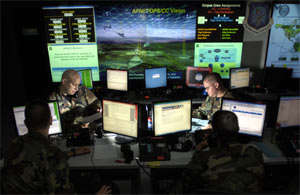Fusion center
 | |
Contents
Official narrative
Fusion Centers are to facilitate the sharing of information to reduce that danger of "terrorism", many democratic countries have been developing them as part of the "war on terror".
Alternative view
Fusion centers are demonstrably ineffective at fighting "terrorism", and yet the UK/US model has been repeated in several other countries worldwide. This apparent paradox is resolved by noting the hypocrisy of the "war on terror". Fusion centers, like TWOT, facilitate deep state control by bypassing existing governmental structures. Their often nebulous nature facilitates plausible deniability and easier dodging of legal responsibilities such as FOIA requests.[1]
Ineffectiveness of their stated aim
A two-year investigation by the US senate found that "the fusion centers often produced irrelevant, useless or inappropriate intelligence reporting to DHS, and many produced no intelligence reporting whatsoever." [2][3] The report also said that in some cases the fusion centers violated civil liberties or privacy.[4] In the light of this report, their continued expansion deserves serious reflection.
Mission creep
Since 2006, the US federal government and the Department of Homeland Security have helped states and major cities set up a network of 58 fusion centers. Originally created to improve the sharing of “anti-terrorism intelligence” among state, local and federal law enforcement agencies, their mission was quickly expanded to include “the collection and analysis of information from law enforcement agencies, the private sector and the intelligence community” on “all crimes and all hazards.”[5]
The ACLU writes that "for many [Fusion Centers] the scope of their mission has quickly expanded - with the support and encouragement of the federal government - to cover "all crimes and all hazards." The types of information they seek for analysis has also broadened over time to include not just criminal intelligence, but public and private sector data, and participation in these centers has grown to include not just law enforcement, but other government entities, the military and even select members of the private sector."[6]
An example
| Page name | Description |
|---|---|
| InfraGard | Program to turn private-sector corporations - having access to enormous amounts of information on citizens - into surrogate eyes and ears for the FBI. |
Related Document
| Title | Type | Publication date | Author(s) | Description |
|---|---|---|---|---|
| Document:Chief of Defence Intelligence at RUSI 180518 | speech summary | 24 May 2018 | Euan Grant | There need to be exponential growths in information operations [..] and in cooperation with offensive cyber ops. |
References
- ↑ Document:Unthinking extremism - Radicalising narratives that legitimise surveillance
- ↑
{{URL|example.com|optional display text}} - ↑ US Senate Permanent Subcommittee on Investigations (October 3, 2012). "Investigative Report Criticizes Counterterrorism Reporting, Waste at State & Local Intelligence Fusion Centers".Page Module:Citation/CS1/styles.css must have content model "Sanitized CSS" for TemplateStyles (current model is "Scribunto").
- ↑ http://www.foreignpolicy.com/articles/2012/10/03/senate_report_says_national_intelligence_fusion_centers_have_been_useless
- ↑ http://www.washingtonreport.me/2009-july/fbi-agent-provocateurs-and-fusion-centers-boys-gone-wild.html
- ↑ https://www.aclu.org/report/whats-wrong-fusion-centers-executive-summary